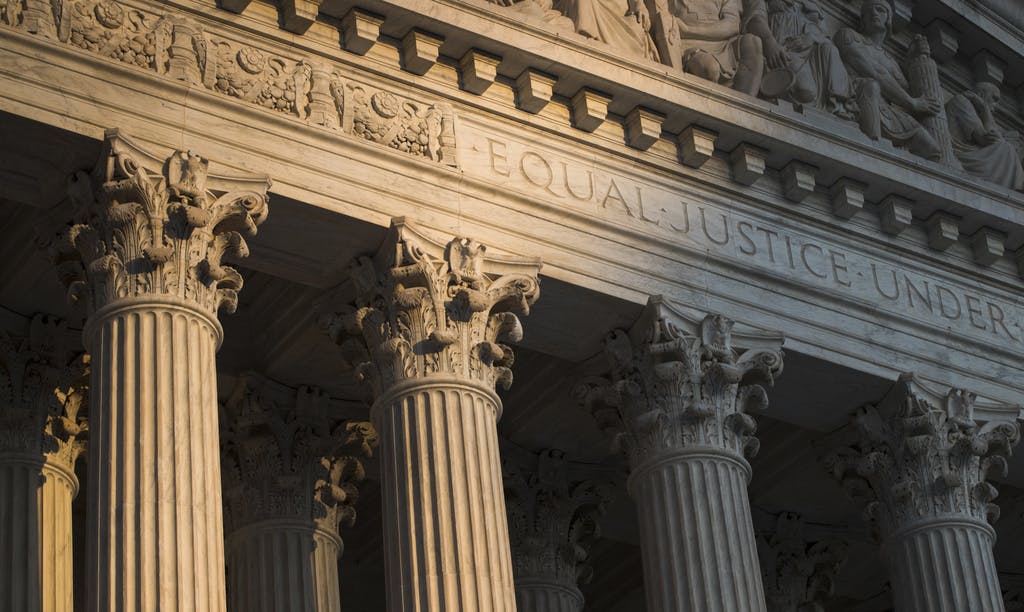High Court Appears Poised To Scale Back Legal Deference to Federal Regulators in Dispute Over Herring Fishing Rules
Overturning the Chevron doctrine could have sweeping, transformative effects on America’s regulatory environment.

The Supreme Court’s conservative majority, weighing a dispute over fishing regulations, appears poised to scale back the authority of federal regulators to interpret laws passed by Congress.
The case, Loper Bright Enterprises v. Raimondo, argued Wednesday morning, concerns a regulation intended to prevent the overfishing of herring along the New England coastline. The company that brought the case argues that the regulation was not authorized by Congress but rather written by the Department of Commerce.
The core issue in the case, though, stretches far beyond the fishing industry. The companies that brought the case, Loper Bright Enterprises and Relentless Inc., are aiming to overturn a longstanding precedent known as Chevron deference.
Under the decades-old doctrine, administrative agencies are given leeway to interpret laws passed by Congress when those laws are deemed to be silent on a specific subject and as long as the interpretation is considered “reasonable.”
The Chevron doctrine is a keystone of administrative law as it exists in America today. Its supporters argue that it gives the power to interpret policies written by Congress to an elected official, the president, who has considerable sway over the implementation of regulations through Chevron deference because executive branch staff fall under the chief executive’s authority.
These advocates suggest that should Congress disagree with an administrative agency’s implementation of law, it can pass legislation to specify its intent.
Opponents of Chevron deference contend that the standard is a violation of due process and that administrative agencies or administrative law judges within those agencies should not have the authority to impose their own interpretations of law, a task that falls under the jurisdiction of courts.
While there have been prominent conservatives who have supported the Chevron doctrine, like the late Justice Antonin Scalia, overturning this regulatory scheme has long been a goal of conservatives, as well as many business interests.
At oral arguments Wednesday, the court’s most conservative members appeared skeptical of the Chevron doctrine.
Justice Neil Gorsuch said that the doctrine is confusing for lower court judges, “even in a case involving herring fishermen, and the question of whether they have to pay for government officials to be on board their boats.”
Justice Gorsuch added, “Lower court judges, even here in this rather prosaic case, can’t figure out what Chevron means.”
Justice Gorsuch did probe at whether the Court needed to rule on the Chevron doctrine as a whole or whether the Nine might pass down a more limited ruling, asking, “Do we have to decide this constitutional question?”
Justice Brett Kavanaugh also criticized the doctrine as providing an unstable regulatory regime, given that presidential elections have a large effect on how administrative agencies are run, saying, “That is not stability.”
Justice Kavanaugh also suggested that he thinks it is the role of the judiciary rather than the executive branch to determine how a piece of legislation ought to be interpreted.
“It’s the role of the judiciary historically under the Constitution to police the line between the legislature and the executive to make sure that the executive is not operating as a king,” he said.
One of the liberals on the high court, Justice Elena Kagan, questioned the wisdom of sending what are currently administrative cases to traditional courts, given the sort of expertise required to effectively rule on many cases currently handled by administrative courts.
“Will courts decide these issues as to things they know nothing about?” Justice Kagan said. “Courts that are completely disconnected from the policy process, from the political process, and that just don’t have any expertise and experience in an area or are people in agencies going to do that.”
Another of the court’s liberals, Justice Ketanji Brown Jackson, recused herself from the case because she had heard it during her time as an appellate judge. Justice Jackson did hear arguments, though, for another case that was consolidated with Loper Bright, Relentless, Inc. v. Department of Commerce.
Justice Jackson did push back on points made by Justice Kavanaugh, saying, “I guess my concern is, I suppose, judicial policymaking is very stable — but precisely because we are not accountable to the people and have lifetime appointments.
While the effects of a ruling on Chevron would depend on the scope of the court’s ruling, an overturn of the Chevron doctrine could have sweeping, transformative effects on America’s regulatory environment, with many regulatory cases from the past 40 years hinging on the doctrine.

